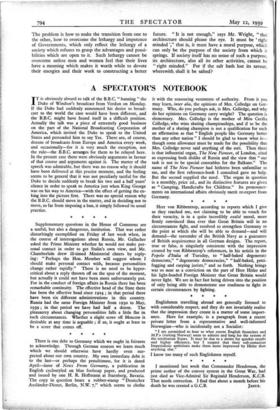A SPECTATOR'S NOTEBOOK
IT is obviously absurd to talk of the B.B.C. " banning " the Duke of Windsor's broadcast from Verdun on Monday. If the Duke had suddenly announced his desire to broad- cast to the world the case would have been different, and the B.B.C. might have found itself in a difficult position. Actually the talk was a piece of extremely good business on the part of the National Broadcasting Corporation of America, which invited the Duke to speak to the United States and persuaded him to say Yes. There are, of course, dozens of broadcasts from Europe and America every week, and occasionally—for it is very much the exception, not the rule—the B.B.C. arranges for them to be relayed here. In the present case there were obviously arguments in favour of that course and arguments against it. The matter of the speech was admirable, but there was no reason why it should have been delivered at this precise moment, and the feeling seems to be general that it was not peculiarly tactful for the Duke to decide suddenly to break his two and a half years' silence in order to speak to America just when King George was on his way to America—with the effect of getting the ex- king into the picture first. There was no special reason why the B.B.C. should move in the matter, and in deciding not to move, so far from imposing a ban, it simply followed its usual practice.


















































 Previous page
Previous page